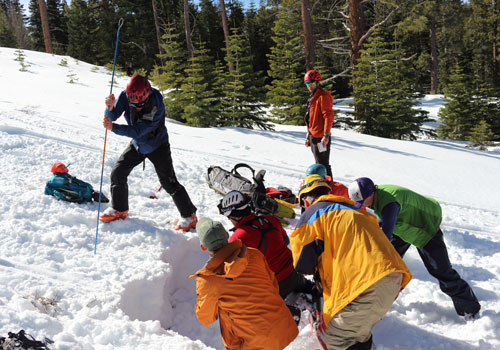
Douglas County Sheriff’s Search & Rescue Academy Equipment
Starting with the second week of the academy, trainees must be equipped to work on simulated SAR missions in the backcountry in all weather conditions and during all hours of the day. The DCSAR policy and procedures document as well as the FUNSAR book outline more comprehensive list of equipment that rescue members should have in their “24-hour” pack. This list is a subset of those lists intended to outline the most important items that will be required to complete the academy.
Required Equipment
- Clothing
- Winter – good water proof / breathable pants & jacket (i.e. Gortex)
- Boots – suitable for cross country hiking (30-55 pound) loads
- Hiking pants – no blue genes
- Socks – non-cotton, wicking, wool is good, have an extra pair
- Base layers – polypropylene, silk, polyester work well
- Hat – something to cover ears and keep you warm
- Rescue pack –2000-3500 cubic inch work well for most
- Knife
- Whistle
- Headlamp
- First aid kit – suitable for your personal use (see FUNSAR appendix 6)
- Gloves – leather work gloves; warmer winter gloves
- Compass – suggest orienteering type with 24K UTM grid, sighting mirror can double as emergency signal
- Note pad/pencil
- Eye protection – sunglasses, clear safety glasses
- Water carrying – 2+ liter carrying capacity, bladders work good when temps are above freezing, consider using bottles in winter
- 18” – 24” measuring tape
- Watch
- 20’ 2” webbing
- 12’ 7/16” or 1/2″ rope (for knot practice) – some may be available through the unit
- Prusik – made from 6’ of 7mm or 8mm accessory cord (7mm goes with7/16” rope / 8mm goes with 1/2″ rope)
- Expendables
- Food – enough to get through 12 hours
- Batteries (for head lamp, flash light, GPS – unit GPS’s use AA)
- Sun screen / lip protection
Recommended Equipment
- Clothing
- Black or kaki BVU / cargo pants
- Gaiters – Gortex is good
- Radio harness – consider extra pockets for GPS, cell phone, papers
- Sunglasses
- Ground sheet / tarp
- Flashlight
- Fire starter – matches, lighter, flint, tender (suggest 2 methods)
- Folding saw
- 50’ nylon cord
- Leaf bag (large)
- Wire / plastic ties (8)
- Expendables
- Food – enough to get through 24 hours in below freezing conditions
- Batteries (for head lamp, flash light, GPS – unit GPS’s use AA)
- Sun screen / lip protection
- Insect repellant – DEET
- Trail tape
- Toilet paper
- Tissue paper / baby wipes
- Duct tape
Nice to Haves
- GPS – unit standard is Garmin Oregon 300
- Stove – ability to make warm drink in snow
- Helmet – type depends on activity – climbing, ski, ATV
- Trekking stick
- Goggles
- Signal mirror
- Carabiners (2)
